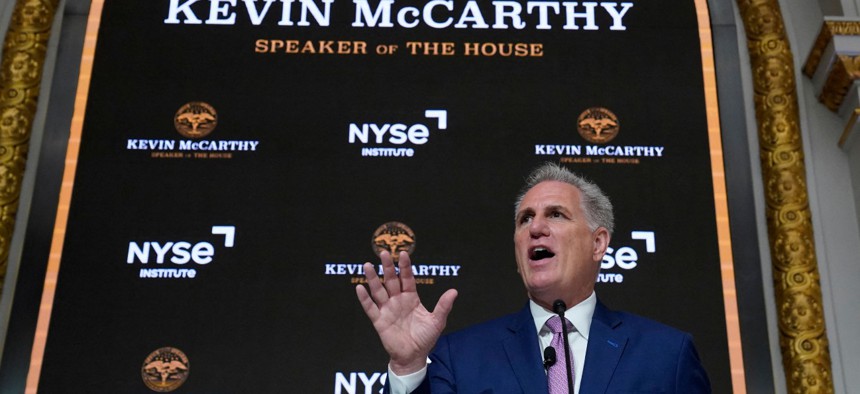
House Speaker Kevin McCarthy delivers a speech on the economy at the New York Stock Exchange on April 17. TIMOTHY A. CLARY/AFP via Getty Images
McCarthy Vows to Cut ‘Overgrown Bureaucracy’ in Opening Bid of Debt Ceiling Negotiations
Republicans will vote on a plan to restore tight budget caps on domestic federal agencies.
The Biden administration must agree to cuts that would lead to a smaller federal workforce to avoid a debt default, the top congressional Republican said on Monday.
House Republicans will soon vote on a bill to raise the debt ceiling and significantly scale back budgets for non-defense federal agencies, Speaker Kevin McCarthy, R-Calif., said at the New York Stock Exchange. He said the measure would, as anticipated, slash discretionary spending at domestic agencies to their fiscal 2022 levels, leading to dramatic cuts of more than 20%. The forthcoming bill would cap annual spending growth to just 1% for the next decade.
McCarthy sharply criticized President Biden for refusing to negotiate over the nation’s debt limit, which the Treasury Department is set to hit later this summer. Biden has said McCarthy is risking economic calamity by declining to go along with a “clean” bill to raise or suspend the debt ceiling, potentially leading to the first ever default. The two sides remain at a standstill and have not met since Feb. 1, with the White House saying it would only negotiate over spending levels if those conversations were not tied to the debt ceiling.
The speaker said the Republican plan does not amount to “draconian limits” and the departments of Defense and Veterans Affairs would be exempted from the cuts.
“But the bloated, overgrown bureaucracy that has expanded under President Biden needs to be pruned, and that’s exactly what we’ll do,” McCarthy said.” If Washington wants to spend more, it will have to come together to find savings elsewhere, just like every household in America does.”
The plan, McCarthy added, would “restore discipline” to the federal budget. He called Biden’s fiscal 2024 budget blueprint “unserious.” Instead, Republicans will seek to identify wasteful spending “in all its forms” and claw back unspent COVID-19 relief funds. In addition to Defense and VA spending, McCarthy said the plan would not affect Social Security or Medicare. He said the proposal would include new work requirements for individuals receiving federal assistance.
McCarthy stressed Biden’s preferred approach was a non-starter in the House.
“Let me be clear: a no-strings-attached debt limit increase cannot pass,” the speaker said. “But since the president continues to hide, House Republicans will take action.”
The proposed spending cuts would bring back an era of constrained budgets in place after President Obama signed into law the 2011 Budget Control Act following tense debt ceiling negotiations with congressional Republicans. Lawmakers generally agreed to budget deals that increased spending above the tight restrictions that would have otherwise been in place for that 10-year period, but the law still led to significant belt-tightening across government.
Christie Stephenson, a spokesman for House Minority Leader Hakeem Jeffries, D-N.Y., said Democrats would evaluate any legislative text they receive, but made clear they were unlikely to support the Republican plan.
"A speech is not a plan," Stephenson said. "Extreme MAGA Republicans continue to treat the full faith and credit of the United States as a hostage situation while their so-called budget proposal remains in the witness protection program."
The White House has similarly pressured Republicans to put forward a budget, but has not set specific preconditions for another meeting.
While pledging to “come together” and saying a default is “not an option,” McCarthy sought to shift blame onto the White House in the event such an outcome does occur.
“The longer President Biden waits to be sensible, to find agreement, the more likely it becomes that his administration will bumble into the first default in our nation’s history,” McCarthy said.
While economists and lawmakers have speculated about a range of outcomes if an unprecedented default were to occur, most have agreed the most likely scenario would require the Treasury Department to delay all government payments until it had enough money available to meet the demands of a given day.
That would require federal employees to either face furloughs or work with only the promise of back pay once the situation was resolved. In another possibility, which experts have called politically and potentially legally untenable, Treasury would prioritize some payments while allowing others to go unpaid. In either scenario, agency payments to beneficiaries, states, grantees, contractors and, potentially, their own employees, would be disrupted.
McCarthy said the House will vote on the not-yet-introduced Republican bill in the coming weeks.







